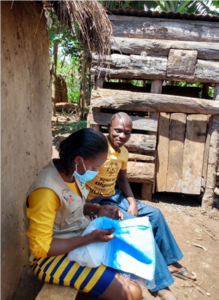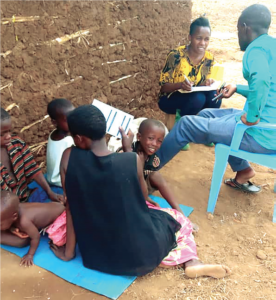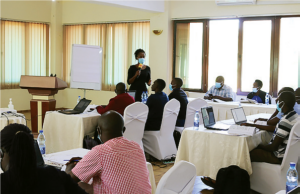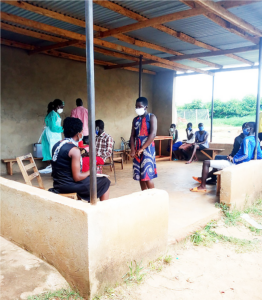 |
Immaculate AkusekeraBachelor of Veterinary Medicine, MSc CEB Muk) Host Site: National Animal Disease Diagnostics
|
||||
ABOUT THE FELLOWDr. Immaculate Akusekera holds a bachelors degree of Veterinary medicine and a Master of Science in Clinical Epidemiology and Biostatistics from Makerere University. During the two years fellowship training, she has gained skills in investigation of public health emergencies, non-scientific communication, scientific communication, or dissemination. She developed her leadership skills, skills in reporting of public health events and analysis of public health surveillance data. She also trained and prepared policy briefs during her stay on the fellowship. She interfaced and used analysis software like epi-info & STATA for analysis of the data that was generated during the implementation of the various projects, she therefore improved the analysis skills gained during her masters education. She additionally disseminated her findings by sharing several articles for publication in the Ministry of Health quarterly epidemiological bulletin, technical reports, and manuscripts. She has implemented several projects including a quality improvement project, one HIV project, COVID 19 projects and Anti microbial Resistance projects during which she developed a skill of coordination, organizing meetings, leading implementing teams successfully. She has developed a career in one health issues and AMR and she has implemented projects and write ups around this subject matter. Before she joined the program, Immaculate worked as the District Veterinary Officer in Kibaale District. The investigations led during her stay on the program included: measles outbreak in Nakivaale refugee settlement, COVID 19 cluster among Health Care workers, Malaria mortality in Kakumiro, an assessment of bed net coverage and usage in Kibaale, time to graduation and factors associated among orphans and vulnerable children supported by Baylor in the Rwenzori region, KAP towards AMR among farmers, KAP towards COVID 19 during the early phases of the pandemic and response to the first community case (case with no known travel history in Masindi) Additionally, she supported the surveillance of COVID 19 deaths and cases in Fortportal, Mubende regional referral hospitals. She is currently supporting the mentorship of field epidemiologist trainees from Entebbe regional referral hospitals and is an editor for the National One Health bulletin.
Achievements at the Host SiteNational Animal Disease Diagnostics and Epidemiology Centre (NADDEC- Entebbe)
Fellowship program specific achievements
Summary of Epidemiological Study: Title: Measles outbreak propagated by not isolating measles case-persons: Nakivaale refugee Background:On 20 February 2020, four months after a single-dose mass measles immunization campaign targeting children 9 months-17 years in Uganda, a measles outbreak was reported in Nakivale refugee settlement in Isingiro district, southwestern Uganda. We investigated the outbreak to determine its scope, identify risk factors for transmission, and recommend evidence-based control measures. Methods: We defined a case as an acute illness characterized by a generalized maculopapular rash lasting ≥3 days and fever, plus one or more of: conjunctivitis, cough, and/or runny nose in a Nakivale refugee settlement resident. A confirmed case was a suspected case with measles-specific IgM (+). We reviewed medical records and conducted active community case-finding. In a case-control investigation involving probable case-persons and age- and neighbor- matched controls, we evaluated possible exposure factors for association with illness. We calculated one-dose vaccination coverage by calculating the percentage of controls with a one-dose self-reported vaccination history. Results: We identified 79 case-persons (attack rate [AR]=6.3/10,000), including five confirmed cases; 21 (32%) had arrived at the camp after the vaccination campaign had completed. Forty-four (56%) case-persons reported no measles vaccine history, of whom 24 (55%) were camp residents during the vaccination campaign. Children <5 years (AR=27/10,000) were the most affected age group, while children aged 5-18 years and those >18 years had similar attack rates (2/10,000). Rushasha sub-county residents (AR=45/10,000) were the most affected by the outbreak. The epidemic curve revealed a propagated outbreak with a 29-month-old index case, a longstanding camp resident who was reportedly vaccinated in the recent campaign, having onset on 7 December 2019 (6 weeks after the campaign). Among all exposures evaluated, only sharing a household with a case-person was associated with infection (43% of case-persons vs. 24% of controls, OR=2.9; 95% CI=1.2–4.7). Self-reported vaccination history against measles was not protective (OR=0.5; 95% CI=0.2-1.6). The single-dose vaccination coverage was estimated at 46%. Conclusion: Only household exposure to a case was associated with illness in this measles outbreak. Vaccination status was not associated with case status; the reasons are unclear but may relate to limitations of self-reporting or vaccine challenges. Vaccination coverage was below the required herd immunity levels of 95%. We recommended supplemental measles vaccination of all susceptible camp residents, vaccination of all new camp arrivals, community health education on signs and symptoms, and early detection and isolation of measles cases. Key lessons learnt during the fellowship
Next Stepsplan to continue supporting the Districts and the country with my enriched skills of epidemiology and also continue supporting the One Health initiative in Uganda. Pictorial
|
|||||
Sign in
Sign in
Recover your password.
A password will be e-mailed to you.




